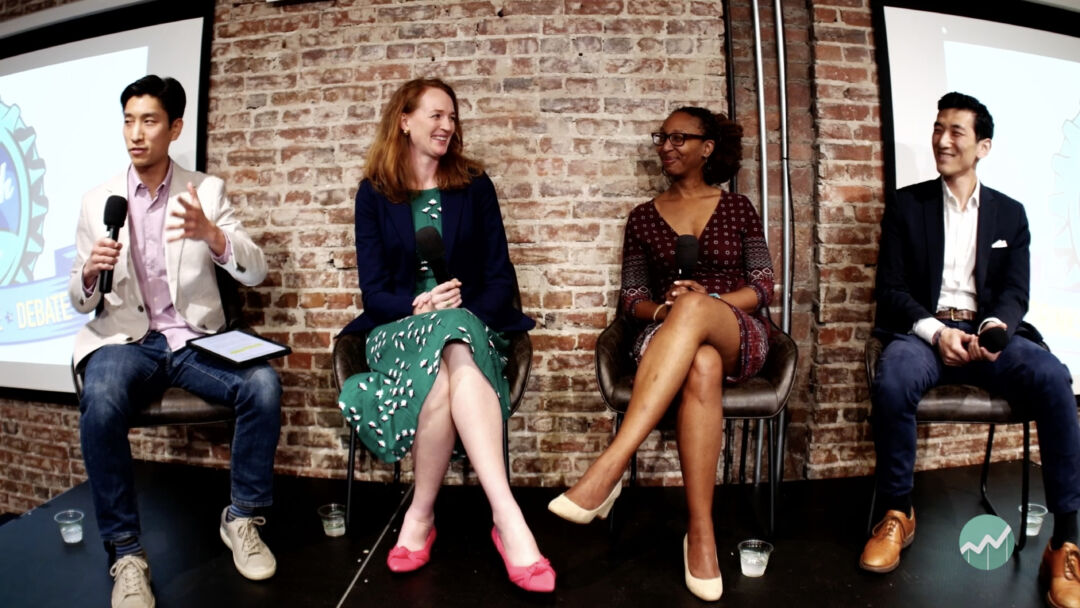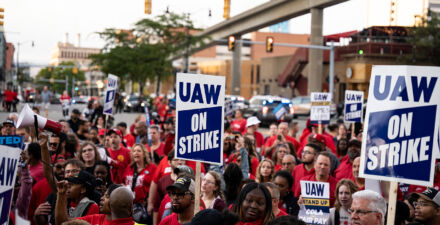Research on Tap event highlights the impact of AI, climate change, and racial inequality on the U.S. economy

The Washington Center for Equitable Growth on May 21 hosted its marquee event, “Research on Tap: Three Forces Shaping the 2024 Economy,” at the National Union Building in Washington, DC. Guests showed up for drinks, dialogue, and debate, as a panel of experts discussed how the forces of climate change, generative AI, and racial inequality are affecting the U.S. economy.
The panel—moderated by NPR’s Adrian Ma, host of The Indicator from Planet Money—featured University of Pennsylvania environmental and labor economist R. Jisung Park, Washington University in St. Louis sociology professor and vice dean Adia Harvey Wingfield, and The Brookings Institution fellow Molly Kinder. The event drew policymakers, journalists, academics, advocates, and other thought leaders to discuss how the U.S. economy is and should be adapting to large-scale disruptions and new technologies, what drives inequality and growth, and how structural change should be at the center of any economic policy debates in this presidential election year.
After a brief introduction, panelists shared their thoughts on what is most notable about the current economic moment in the United States. All three panelists emphasized the rise in labor activism and organizing as a trend to watch, as well as technological advances and the uncertainty around how they’ll end up affecting the labor force. Park also mentioned the dissonance between what economic indicators are saying about the economy and what people report feeling about it.
Ma then guided the conversation to the implications of the panelists’ research on workers and the broader economy. Park discussed the impact of rising temperatures on the U.S. labor force and the economic costs of climate change, including his research finding that heat sickens or contributes to workplace injuries for about 15,000 workers in California alone each year. The increase in the frequency of hot days that is occurring with climate change, he said, will only continue to increase the risk to workers’ health and safety.
Wingfield then detailed the many ways in which racial inequity persists and affects economic growth, including in the so-called grey areas of unexplicit racism that limits the professional growth of workers of color—even in companies that have made very public pledges to champion and promote diversity and inclusion. This career stunting has profound economic impacts, Wingfield explained, not only on the workers personally affected and their employers but also on the broader economy.
Ma then turned the conversation to technology’s impact on the economy, with Kinder explaining how the disruptive nature of generative AI has affected various industries and how it might continue to affect workers and their workplaces into the future. Kinder emphasized how important it will be to ensure that workers benefit from these technological advances and how much work there is to be done to ensure that outcome.
She then raised the Hollywood strikes in 2023 as an example of how workers can shape how AI is used to ensure they benefit from it, underlining the importance of unions in this process. She also expressed concern that workers in many industries may be deeply affected, including high-paid fields such as law and finance where there is low union density.
The panel also examined policy implications of these aforementioned economic impacts, as well as gaps in research that need to be filled to develop sound policies. Park raised the question of being prepared for climate adaptation, in terms of our intellectual infrastructure to enact the changes necessary, as well as the difficulties surrounding workplace regulations and mandates. Wingfield observed that it’s still unclear how workers of color will be affected by new technology—and whether it will have an impact on racial inequality. Kinder questioned whether generative AI is deskilling workers by doing work they used to have to learn to do themselves.
Ma closed the discussion by asking the panelists to reflect on how things have changed in their respective areas of expertise under the Biden-Harris administration and how this year’s presidential election could affect where things stand. Wingfield praised the administration’s overt acknowledgement that racism exists in the workplace and that there are measurable disparities for workers of color when it comes to wages, representation in leadership, and other opportunities for mobility. Kinder and Park mentioned the infrastructure investments and the Inflation Reduction Act’s clean energy funding and the return to evidence-based policymaking as big wins in their areas of expertise.
The panelists then took questions from the audience on topics ranging from the importance of enforcement of labor laws in addition to unions and the business case for addressing climate change to antitrust concerns around AI and breaking the link between racism and capitalism. Panelists and guests then were able to carry on the conversation in a networking happy hour that allowed for continued discussion of these important issues affecting the U.S. economy.
This event marked the relaunch of this Equitable Growth event series in a hybrid format, with a streaming component for those who were not in Washington or could not attend in-person.






